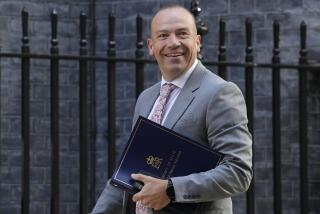Thatcher Targets Suspects’ Historic Right to Silence : Moves to Curb Irish Terrorists
- Share via
LONDON — The government today proposed ending the right of criminal suspects in Northern Ireland to remain silent as part of a new crackdown on the Irish Republican Army.
The measure, which will end a historic right dating from the 17th Century, was put forward immediately in the Commons and is all but certain to become law within three months.
The announcement by Northern Ireland Secretary Tom King came a day after the government banned broadcast interviews with members of the outlawed IRA and 10 other militant Roman Catholic and Protestant groups in Northern Ireland.
Aimed at Terrorists
The measure announced today applies to all criminal suspects in Northern Ireland, but it is aimed at terrorist suspects.
Another Cabinet minister, Douglas Hurd, said the government is considering introducing similar legislation to end suspects’ right to silence in England and Wales as well.
Prime Minister Margaret Thatcher’s Conservative Party has a huge majority in the 650-member Commons, so the measures are likely to be approved.
King, in a statement accompanying his announcement to Commons, said:
“Members of terrorist organizations are being trained to refuse to respond to questions put by the police--and this technique is increasingly being adopted by those suspected of serious crimes, including racketeering. Justice is being thwarted.”
Unification Sought
The IRA is fighting to drive the British out of the mainly Protestant province of Northern Ireland and to unite it with the Roman Catholic Republic of Ireland.
This is the first time the British government has announced that it will introduce laws to end the right to silence.
Courts now are not allowed to take into consideration that a suspect refused to answer police interrogation.
King said that under the new law a judge will be able to draw “whatever inferences appear proper” from the fact that a suspect refused to answer police questions.
Drawing a Conclusion
Sources said judges and juries will be able to conclude that a suspect’s silence is an indication of guilt, particularly if the suspect produces a detailed defense in court after refusing to answer police questions.
Sinn Fein, the IRA’s legal political wing, said the measure “effectively moves that (British) government closer to the governments of Chile and South Africa.”
“The right to silence is a (centuries-old) civil liberty, enshrined in the legal systems of most of the world’s civilized countries,” Sinn Fein said in a statement.
Spokesman Kevin McNamara of the opposition Labor Party said in a radio interview, “Northern Ireland is being used as a laboratory for Draconian measures to be used later in other parts of the United Kingdom.”
In addition to ending the right to silence, the government has said it plans legislation this winter enabling it to freeze and seize the funds of terrorist organizations.
It also plans to require candidates in Northern Ireland elections to take an oath disavowing violence.
This is aimed at Sinn Fein, which is formally committed to “armed struggle” to unite Northern Ireland with the Republic of Ireland under a leftist administration. But the Sinn Fein leadership says it will have no problem taking a no-violence oath.
More to Read
Sign up for Essential California
The most important California stories and recommendations in your inbox every morning.
You may occasionally receive promotional content from the Los Angeles Times.








